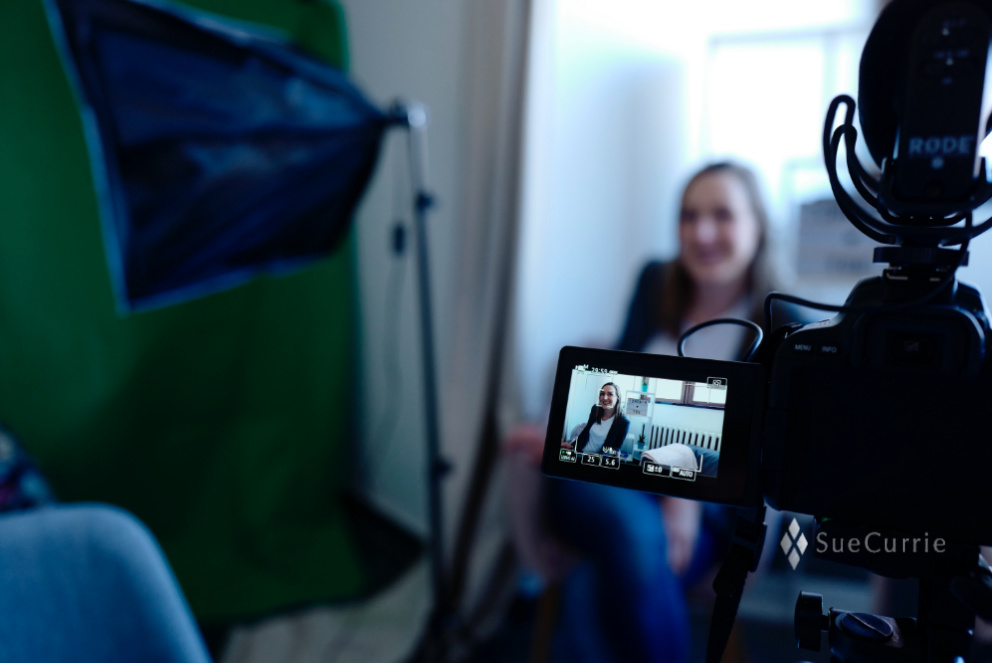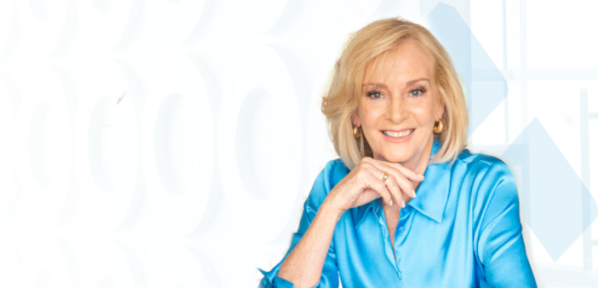Podcasts and webinars are familiar to most of us now and are a way to share your message with many people. Perhaps you already include one of those mediums in your marketing mix. Along with other tactics of marketing and public relations, what about if you really do capture attention with your message and a television show asks you to appear live “on camera”. What do you do?
I hope you jump at the chance and say, “yes”.

As a personal brand and image consultant, I advise my clients on a variety of methods to be seen, heard and noticed by combining my past experience in television presenting, media and the fashion industry.
I clearly recall the day my media career began when Prime Television flew me down from Sydney to Wagga Wagga to audition, I was absolutely petrified. They sat me on the set, put the autocue up in front of me and said, “Action!” Well, my palms were sweating, my knees where shaking, my voice was somewhere up in my throat…but somehow, I did get through it and passed the audition test. I was later offered the job as newsreader.
When you’re asked to do a media interview, you need to put fear or nervousness into perspective. You do not want to lose this opportunity to showcase your personal brand or business.
You might think that your knocking knees and shaky voice will overcome you, but generally nerves are normal and not noticed too much by other people. Nerves may stop you approaching TV or radio stations for publicity because you are too scared to go on-air and do that interview.
Don’t let that happen. If you do get the chance to be on camera for an interview try these tips to look and feel confident.
Know Your Content
TV hosts and producers generally won’t give you too much information about the questions. Why? Because they don’t want you to sound stilted and rehearsed when you give answers. You are generally there because you are the expert (or say you are) on that particular subject and because you do know your subject better than anyone else you will be able to answer questions spontaneously.
However, you should think about some possible questions they may ask and prepare answers beforehand. Have your partner or a friend ask you a few questions and have a rehearsal – practice. You can find out what angle are they taking. What are they expecting from you – what are the question areas?
Research
Watch the program beforehand if you can to get a feel for the type of show it is. At least look up the website and perhaps view a video clip or listen to a podcast. Find out as much as you can about the program on which you're being asked to appear – is it live or pre-recorded? Is the audience completely general, or is it targeted at housewives or business people? Think about the points you could make which are most interesting, useful and relevant to that particular audience.
Arrive early so you can meet and chat with other guests, hosts, producers to feel a bit more comfortable and familiarise yourself with the surroundings.
Get to the Point
Do try and get to the main point of your answer quickly without wafting on. A short, sharp, interesting point works best in the media especially for television and will be easier for viewers to remember. If you don’t give enough information the interviewer will simply ask a follow-up question.
If you have something to promote (such as a book) keep it in mind and look for an opportunity to get your point across or the title of the book. All well and good being great media “talent” but you could use the opportunity to at least promote your business name. Try and be in control and use every opportunity to get your message across.
Make It Interesting and Descriptive
Make your answers more memorable by using real stories and descriptive words. Cut through the clutter with words that paint a picture in the mind of the listener. As an example in a radio interview I did, I told a story about a young journalist interviewing a well know media personality and used the word “hyper-bowl”, the media identity kindly corrected her and said the word is pronounced “hi -per-bo-lee”. We made it a fun, interesting reference to the issue being discussed.
Have Something to Say
Be aware of the latest news, gossip or current affairs stories particularly that relate to your topic. Read the papers, listen to radio and be as informed as you can because you never know what might come up during the interview. If there are controversial issues in your area of expertise, work out where you stand, and what you should say. It is better to respond rather than say “no comment”. Don't be afraid to put your point of view across. If you don’t know the answer, say so.
Friendly and Attentive
Remember that what you’re really doing is having a conversation. Listen to the interviewer’s questions. The host will appreciate your attentiveness. Use the interviewer’s name to make it more personable when answering questions.
If you’re doing an interview face-to-face, use eye contact and try and interest the interviewer in what you’re talking about rather than thinking – do I sound OK – do I look alright on TV. If your eyes flicker around during a TV interview, you look uncomfortable, and possibly a bit shifty. If you keep your eye-line focused on the interviewer, you will come over as being in command of your subject. Just try and relax and take your time. And remember to smile, you will look and sound a lot friendlier.
Animation and Gestures
Be bright and buoyant in your answers. You need to be slightly more animated and larger than life. Pep up your delivery so that it is energetic and enthusiastic, rather than dull and low-key. Television is entertainment after all and broadcasting is a performance! The more engaging you appear the more interested and involved the audience will feel.
It’s perfectly okay to move, rather than sitting stiffly and looking unnatural. Just be aware of exaggerated movements or unconscious movements such as flicking your hair or tapping your fingers. If you always ‘talk’ with your hands, like I do, that’s okay; just don’t overdo it. Also be aware of knocking your microphone, movement or other sounds that may interfere..
Look & Sound Good
Always take time to warm up your voice. You will come across as more articulate and authoritative. It will help prevent a “frog in the throat” during the interview. Sip room temperature water before and during the interview. Never drink anything too hot or cold and nothing with milk in it otherwise you’ll be constantly clearing your throat.
Dress well and look your best. Take your cue from the presenters on the show you’re appearing on. Perhaps it’s business casual for a morning show or more business corporate for a news show. Wear make-up. Ok guys maybe just a touch of powder to eliminate shine.
If you stumble, or slip-up, or use the wrong person’s name, just forget about it and move on. Even top TV presenters make mistakes.
The key is to relax and enjoy the interview as much as possible – after all it is your opportunity to promote your business, product or service and hopefully raise your profile and profits.
Media and image management is all part of personal branding. Learn more in my free video series, NOOK, LOOK, HOOK, 3 Steps to Build a Stand Out Personal Brand.
Sue Currie is a speaker and the author of IMPRESSario, Present and Promote the Star Within You. She is recognised as a leading authority on personal branding and professional presence to help business executives and entrepreneurial professionals communicate with impact and influence. Sue’s suite of services delivered through workshops, consulting, coaching and keynote presentations provides a multi-faceted approach to gain high transformation for her clients.



